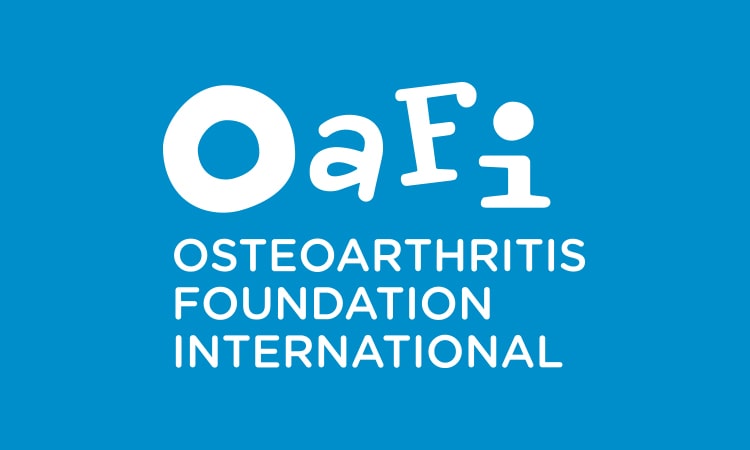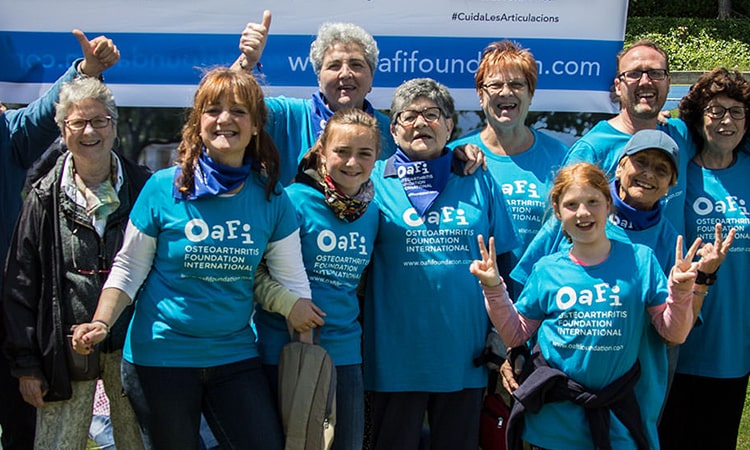- Foundation
- Actions
- Osteoarthritis
- Actuality
- OAFI Radio/TV
- Get Involved
- Contact
OAFI
Osteoarthritis International FoundationC/ Tuset, 19 · 3º 2ª
08006 Barcelona
(+34) 931 594 015
info@oafifoundation.comSchedule:
Monday-Thursday 9AM-6PM
Friday 8AM-3PM
-

-

-

The importance of quality of life assessment for the global management of OA

OA PATIENTS TASK FORCE
Vitaloni M, Botto-van Bemden A, Sciortino Contreras RM, Scotton D, Bibas M, Quintero M, Monfort J, Carné X, de Abajo F, Oswald E, Cabot MR, Matucci M, du Souich P, Möller I12, Eakin G, Vergés J. Global management of patients with knee osteoarthritis begins with quality of life assessment: a systematic review. BMC Musculoskelet Disord. 2019 Oct 27;20(1):493. doi: 10.1186/s12891-019-2895-3.
Barcelona,
11/11/2019
The importance of quality of life assessment for the global management of OA: the results of a study lead by patients organizations.
What do we know about the quality of life of patients living with a chronic disease? Osteoarthritis is one of the most common chronic diseases and the most common condition affecting joints. The life of OA patients is deeply undermined by chronic pain and limitations in physical activity which impacts their daily life, social connectedness, relationship and emotional well-being: in one word, their quality of life. This pathology affects approximately 300 million people worldwide, still the assessment of OA patients quality of life and individual factors that may influence it is not a routine in research and clinical practice.
The OA Patients Task Force has recently published a systematic review summarizing the scientific evidence on the impact of knee OA – the most affected joint by OA -on the quality of life of patients and on how individual factors such as demographics, lifestyle or comorbidities affect the quality of life. The OA Patients Task Force is an alliance of patients organizations led by the Osteoarthritis Foundation International (OAFI) and the Arthritis Foundation and collaborating with the most important patients organizations worldwide and medical societies as the Pan American League Against Rheumatism (PANLAR), that aims at raising awareness of this disease and improve the quality of life of OA patients worldwide. After three years of research activity, the results of the study “Global management of patients with knee osteoarthritis begins with the quality of life assessment: a systematic review”, entirely coordinated by the patients organizations with the support of international experts in the field, is published by the international journal BMC Musculoskeletal disorders.
The authors initially identified more than 9,000 publications mentioning the quality of life of knee OA patients in specific scientific databases. After an in-depth review process, 62 high-quality articles reporting original data on the topic were included. Most of the studies were conducted in Europe followed by North, Central and South America. The data of almost 25,000 patients were presented in the 62 studies and, of this population, 93.4% were women confirming the gender bias of this disease.
All the studies analyzed revealed a worse quality of life for knee
OA patients when compared to a group without this disease. Also, when females
were compared to males, women reported having a worse quality of life.
Furthermore, lifestyle factors and common social determinants of health, such
as unhealthy weight, low physical activity, low socioeconomic and educational
level, mental health problems, as depression or anxiety and also, lacking
familial relationship were identified by the authors as factors that can
additionally reduce the quality of life in knee OA patients. On the other hand,
higher total mindfulness, as well as knee self-management programs delivered by
health care professionals, were proved to improve the quality of life of
patients. Similarly, knee OA surgical outcomes depend on demographics and
individual factors.
The authors concluded that health promotion and self-management
strategies addressing unhealthy weight and low levels of physical activity may
improve the quality of life. The data highlights a gap and opportunity to
improve the quality of life in knee OA patients by incorporating dietary
guidelines and nutritional education. Programs where patients participate in
education and supervised exercise delivered by trained physiotherapists, nurses
or expert patients can improve physical activity and quality of life also postponing
surgery for total joint replacement. These programs also help to create
connectedness among patients improving their mental health conditions related
to OA.
Quality of life is a powerful indicator to consider when implementing and evaluating OA management programs. It needs to be reassessed during health interventions to ensure their effectiveness. The factors open to modulation such as weight, physical activity, emotional or mental health, and social connectedness can be used to customize management strategies and intervention to improve knee OA patients quality of life. Even though OA studies routinely include pain and function scores they have not yet routinely included variables assessing QoL, which also influences how patients feel, function, and survive. Ensuring a standard quality of life assessment implemented as routine care worldwide is imperative for healthcare professionals to gain a better understanding of OA wishlist ensuring the most optimal management.
This study is a stepping stone to gain insight into the necessities and priorities of patients to improve the healthcare process and the management strategies for OA. It represents a great success for patients and the patients organizations advocating for them. The OA Patients Task Force is continuously developing activities to make OA patients voice heard and sensitize society and the competent authorities of the astonishing impact of OA on people lives.
Categories :





















